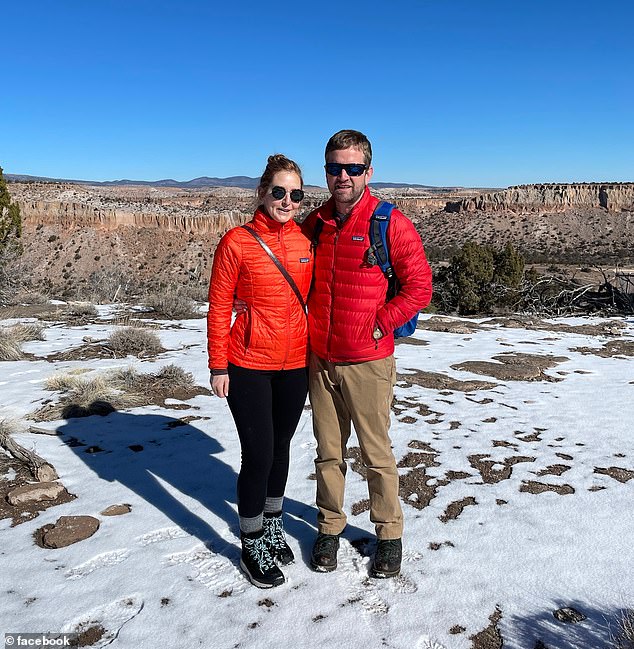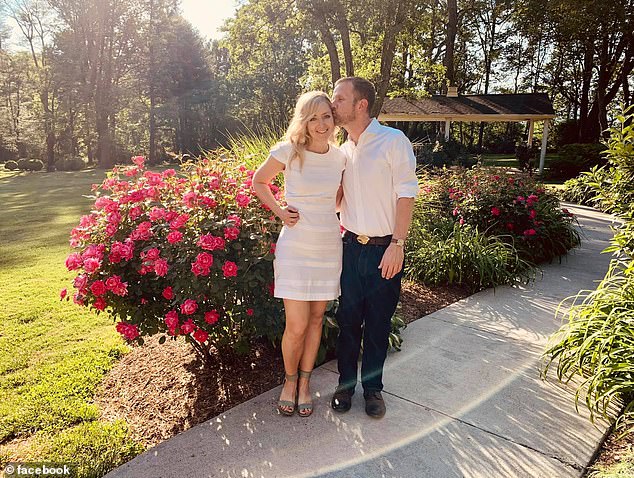Virginia woman, Lauren Canaday, who was clinically dead for staggering 24 minutes after suffering shock cardiac arrest shares what it REALLY feels like to nearly die – and how it changed her
A 39-year-old woman who was declared clinically dead for 24 minutes after suffering cardiac arrest has said she feels like she has been given 'a new lease on life' – and described the unexpected benefits that come with it.
Lauren Canaday, from Virginia, opened up about what it really feels like to die before being resuscitated – and how it has changed her, during an interview with Newsweek.
“When people say death is just a part of life, I take that very literally,” Canaday said.
Eight months ago, she suffered sudden cardiac arrest in her home, and her blood stopped flowing normally for as much as 24 minutes.
Canaday said she has been taking medication for controlled epilepsy for years, and on that fateful day she suffered a grand mal seizure, which causes aggressive muscle contractions and loss of consciousness. She stopped breathing.
Lauren Canaday from Virginia shared what it feels like to die before being resuscitated – and how it has changed her

Canaday survived sudden cardiac arrest at her home thanks to her husband's CPR, before EMTs arrived and shocked her four times with a defibrillator
“My husband was across the hall and heard me say 'oh s***,'” Canaday told Newsweek
'He rushed in and found me unconscious on the floor. I stopped breathing and turned blue.'
Canaday's husband called 911 before performing CPR on his fading wife until ambulances arrived. Miraculously, medics managed to restore her heartbeat after using a defibrillator to shock Canaday four times.
She was rushed to an intensive care unit, where doctors diagnosed myocarditis – an inflamed heart muscle that reduces its ability to pump oxygen through the body – along with a bout of COVID-19.
Canaday said medics speculated about whether her coronavirus infection caused the incident.
Incredibly, she was released from intensive care after just nine days – and Canaday said that as soon as her memory returned, she realized her mindset was radically different after the episode.
“I got really frustrated the first few days because I had no short-term memory and didn't understand what was going on, and I just felt super uncomfortable,” she said.
But as she began recovering and was declared “cognitively intact” by doctors, Canaday said she found overwhelming joy in small moments, from taking a shower to eating a cheeseburger in the hospital.
“I remember a lot of serene moments in and after the hospital, as if the worries I had before didn't matter, and I would get crazy excited about things like cheeseburgers. It just felt really simple,” she said.
“I feel like this is my second life,” Canaday added. 'It feels like I have two birthdays.
'In my first life I was very individualistic and strong. In this life I have a very different worldview and – most of the time – I feel comfortable being dependent on others…
“Many things like status and career success don't matter, except for the needs of survival, creature comforts, and helping others (now).”

Incredibly, Canaday was released from intensive care after just nine days – and she said once her memory returned, she realized her mindset was radically different after the cardiac arrest.

As she began recovering and was declared “cognitively intact” by doctors, Canaday said she found overwhelming joy in small moments, from taking a shower to eating a cheeseburger.
Canaday admitted she was forced to quit her job but spent her free time writing a memoir, released in November, titled “Independence Ave: How Individualism Killed Me and Community Brought Me Back.”
The book explores life with a chronic illness and how you can rebuild your life after a shocking incident throws your life off course.
Canaday said she now prioritizes the simple things in life, like getting enough sleep, eating healthy, exercising, meditating and strengthening her relationships.
“I try to walk 10,000 steps a day and walk as far as I can once a week,” she said. 'I take a lot of time to be quiet, including silent prayer or meditation. I usually go to bed around 8 p.m.'
Canaday said she wants to share her story because many other people have gone through similar experiences and she hopes her words can help them.
She is one of the lucky ones: only 10 percent of people who experience sudden cardiac arrest at home survive.
In January, the Sudden Cardiac Arrest Foundation launched the Arrest Survivor Alliance to support survivors and their family members through an online, global community.
